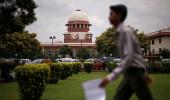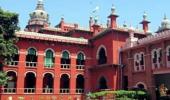The Supreme Court, examining whether states can sub-classify the Scheduled Castes and Scheduled Tribes for the grant of a quota within a quota, said on Thursday that the state governments cannot be selective in granting reservation benefits to backward classes as it will lead to a dangerous trend of appeasement.

The top court is hearing references to revisit a 2004 judgment of a five-judge Constitution bench in the case of EV Chinnaiah vs State of Andhra Pradesh, in which it was held that the SCs and STs are homogeneous groups and hence, states cannot further sub-classify them to grant a quota within a quota for the more deprived and weaker castes in these groups.
A seven-judge Constitution bench headed by Chief Justice D Y Chandrachud said that while conferring reservation benefits on the most backward classes, the State cannot exclude others.
"If there are a host of backward classes, can the State pick out only two for example? Those who are excluded can always challenge their classification under Article 14 on the ground that we fulfil all criteria of backwardness. But the State can also rebut, saying we can classify a caste by looking at the extent of backwardness. It can say that we want to confer reservation to the most backward.
"But while conferring benefits on the most backward, you cannot exclude others. This will become a dangerous trend of appeasement. Some state governments will pick out a few castes while others will pick another set of castes. The idea is not for popular politics to play out in this. We will have to tailor it by laying down the criteria," the bench, also comprising justices B R Gavai, Vikram Nath, Bela M Trivedi, Pankaj Mithal, Manoj Misra and Satish Chandra Mishra, said.
The court, which reserved its judgment after hearing the submissions of the Centre, states and others, said it is the role of the State to give reservation and remove social backwardness and while doing that, if it wants to remove the inequalities being faced by a class, it can do it.
It said sub-categorisation will aid in others within that caste to come up, otherwise only one segment will continue to get the benefits.
Appearing in the court on behalf of one of the parties, senior advocate Manoj Swarup mentioned about the heterogeneity within castes.
The top court had said on Wednesday that all SCs and STs might not be homogeneous in terms of their sociological, economic, education and social status.
"There is heterogeneity in terms of past occupation.... Social status and other indicators may be different for different castes inside the Scheduled Castes. So the degree of social and economic backwardness may vary from one person or caste to another," the bench had said.
On Tuesday, the top court had said it would examine the validity of its 2004 judgment that held that the states do not have the power to further sub-classify the SCs and STs for the grant of quotas.
It had made it clear that it will not get into the arguments related to the quantifiable data that led the Punjab government to provide for a 50-per cent quota within an already existing quota.
Of the 23 petitions, the lead one has been filed by the Punjab government, challenging a 2010 verdict of the Punjab and Haryana high court.
The high court had struck down section 4(5) of the Punjab Scheduled Castes and Backward Classes (Reservation in Services) Act, 2006 that provided a 50-per cent quota and the first preference to the "Valmiki" and "Mazhabi Sikh" castes in public jobs within the SC quota.
It had held the provision as unconstitutional on the ground that it violated the 2004 judgment of the apex court in the Chinnaiah case.
The Chinnaiah judgment had held that any "sub-classification" of the SCs would violate Article 14 (right to equality) of the Constitution.
The 2004 verdict had stated that only Parliament and not state legislatures can exclude castes deemed to be SCs from the Presidential List under Article 341 of the Constitution.
The top court is examining questions that whether a sub-classification inside the SC and ST categories could be allowed like in the case of Other Backward Classes (OBCs) and if the assemblies are competent to introduce laws empowering the states to undertake the exercise.
Assailing the high court's verdict, the Punjab government approached the top court in 2011 and contended that the apex court's 2004 judgment was not applicable to it.
Taking up the Punjab government's plea, a five-judge bench headed by Justice Arun Mishra (since retired), on August 27, 2020, differed with the Chinnaiah judgment and referred it for adjudication by a larger bench of seven judges or more for an authoritative pronouncement.
In the higher education institutions funded by the Centre, 22.5 per cent of the available seats are reserved for SCs and 7.5 per cent for ST students.
The same yardstick is applied in the case of public employment as well.
In Punjab and Haryana, there is no ST population.










